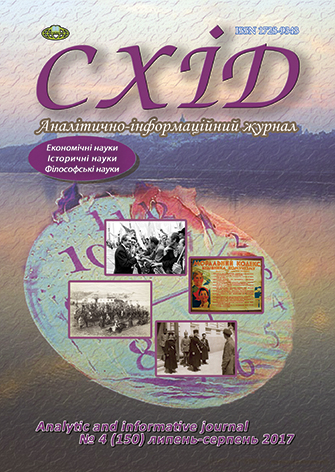Cyborg as a cyborgizated human being: the philosophical thought experiment in film 'Robocop' (2014)
DOI:
https://doi.org/10.21847/1728-9343.2017.4(150).111564Keywords:
artificial intelligence, cyborg, human being, robot, science fiction, thought experimentAbstract
The study analyzes a philosophical thought experiment conducted in film 'Robocop' (2014). The film models the situation within which a human being is transformed into a cyborg, human-robotic hybrid, and explores different treatment of the hybrid. To be a cyborg in film 'Robocop' (2014) is to experience of three kinds of treatments to itself. First kind of treatments shown by Raymond Sellars' position is not to perceive a cyborgizated human being as a human and to treat of him as of a robot. Second kind of treatments shown by Alex Murphy' position to perceive a cyborgizated human being as a human and to treat of him as a human being. Third kind of treatment shown by Doctor Dennett Norton's position is to perceive a cyborgizated human being as a human and to treat of him as a human being but at the same time to think that at the physical level there is no difference between a human being and a robot. Potentially the third kind erases out differences between a human being and a machine held an artificial intelligence what leads to paradox: the technologies which extend human abilities can replace the very human being. The third kind can wipe off the differences between a human being and a machine held an artificial intelligence at physical (neural networks), juridical (machines held artificial intelligence may have rights, freedoms and duties), and ethical (Is it allowed to eliminate machines held artificial intelligence?) levels.
Downloads
References
Husserl, E. (2013). The Crisis of European Sciences and Transcendental Phenomenology. Moscow: Nauka (rus).
Dreyfus, H. (1978). What Computers Can’t Do: A Critique of Artificial Reason. Moscow: Progress (rus).
Markoff, J. (2016). Machines of Loving Grace: The Quest for Common Ground between Humans and Robots. Moscow: Alpina non-fiction (rus).
Rayhert, K. (2017). The transplantation of human brain (mind, personality) into cybernetic organism as a psychic trauma (in Vindicator, RoboCop, 8Man, Ghost in the Shell). Aktualni problemy filosofii ta sociologii [Actual Problems of Philosophy and Sociology], №17, pp. 86-89 (rus).
Heidegger, M. (1993). The Question Concerning Technology. Time and Being. Moscow: Republic, pp. 221-238 (rus).
6. An Open Letter to the United Nations Convention on Certain Conventional Weapons, available at: https://www.cse.unsw.edu.au/~tw/ciair/open.pdf (accessed: 20.08.2017).
7. Autonomous Weapons: an Open Letter from AI & Robotics Researchers, available at: https://futureoflife.org/open-letter-autonomous-weapons (accessed: 20.08.2017).
Churchland, P. S. (1996). Toward a Neurobiology of the Mind. The Mind-brain Continuum: Sensory Processes. Cambridge: London: MIT Press, pp. 281-304.
Clemente, B. (2016). Corporate Abuse and Social Inequality in RoboCop and Fido. The Last Midnight: Essays on Apocalyptic Narratives in Millennial Media. Jefferson: McFarland & Company, pp. 101-111.
Clynes, M. E. & N. S. Kline. (1960). Cyborg and Space. Astronautics, pp.26-27; 74-76.
Dennett, D. C. (1991). Consciousness Explained. New York; London: Boston: Back Bay Books.
Dreyfus, H. L. (1965). Alchemy and Artificial Intelligence. Santa Monica: RAND Corporation.
Dreyfus, H. L. & S. E. Dreyfus. (1985). Mind Over Machine. New York: Free press.
Dreyfus, H. L. (1978). What Computers Can’t Do: The Limits of Artificial Intelligence. New York: HarperCollins.
Dreyfus, H. L. (1992). What Computers Still Can’t Do: A Critique of Artificial Reason. Cambridge, MA: The MIT Press.
Ferguson, J. & D. C. Dennett. (2017). Philosopher Daniel Dennett on AI, Robots and Religion, available at: https://www.ft.com /content/96187a7a-fce5-11e6-96f8-3700c5664d30 (accessed: 20.08.2017).
Johnson, M. E. (2014). Robocop Takes on Philosophy of Mind, available at http://www.groundmotive.net/2014/06/robocop-takes-on-philosophy-of-mind.html (accessed 11.08.2017).
Mori, M. (2012). The Uncanny Valley. IEEE Robotics & Automation Magazine, 2, pp. 98-100. DOI: 10.1109/MRA.2012.2192811.
Noё, A. (2014). Deconstructing the Philosophies of “RoboCop”. Cosmos & Culture: Commentary on Science and Society, available at: http://www.npr.org/sections/13.7/2014/04/04/295314242/deconstructing-the-philosophies-of-robocop (accessed 11.08.2017).
Schneider, S. (2009). Introduction: Thought Experiments: Science Fiction as a Window into Philosophical Puzzles. Science Fiction and Philosophy: From Time Travel to Superintelligence.Hoboken: Wiley-Blackwell, pp. 1-14.
Sofge, E. (2014). You Have Already Complied: RoboCop and the All-Too-Feasible Horror of Brain Hacking. Popular Science, available at: http://www.popsci.com/blog-network/zero-moment/you-have-already-complied-robocop-and-all-too-feasible-horror-brain-hacking (accessed 11.08.2017).
Sweedler, M. (2014). Class warfare in the “RoboCop” films. Jump Cut. A Review of Contemporary Media, available at: https://www.ejumpcut.org/archive/jc56.2014-2015/SweedlerRobocop/ (accessed 11.08.2017).
Downloads
Published
How to Cite
Issue
Section
License
Copyright (c) 2017 Konstantin Rayhert

This work is licensed under a Creative Commons Attribution-NonCommercial-NoDerivatives 4.0 International License.
1. Authors bear responsibility for the accuracy of facts, quotations, numbers and names used.
2. Manuscripts are not sent back.
3. The publisher does not always agree with the authors' opinion.
4. The authors reserve the right to authorship of the work and pass the first publication right of this work to the journal under the terms of a Creative Commons Attribution-NonCommercial-NoDerivatives 4.0 International License. This license allows others to distribute (copy) the published work for non-commercial purposes, provided there is mandatory attribution to its authors and a link to the first publication in our journal.
5. The authors have the right to conclude separate supplement agreements that relate to non-exclusive work distribution in the form in which it has been published by the journal (for example, to upload the work to the online storage of the journal or publish it as part of a monograph), provided that the reference to the first publication of the work in this journal is included.

